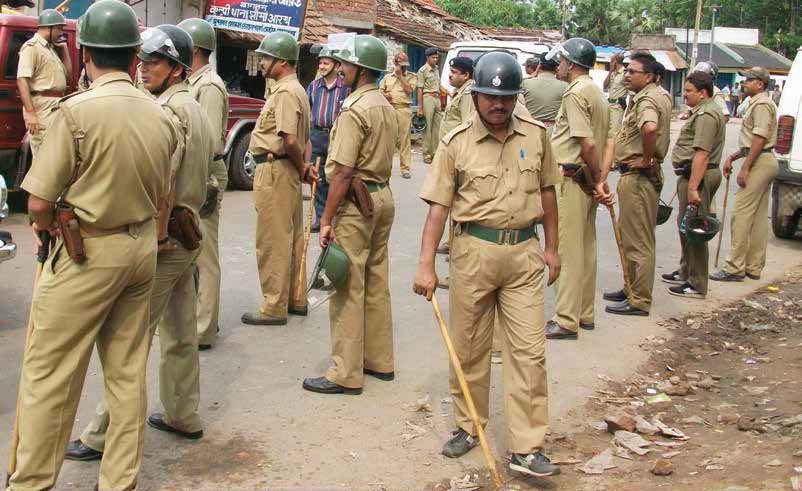This article has been written by Nimisha Dublish of the Vivekananda Institute of Professional Studies, GGSIPU, Delhi. The article discusses Section 340 of Code of Criminal Procedure, 1973, and its related provisions.
It has been published by Rachit Garg.
Table of Contents
Introduction
We have seen a great rise in cases wherein the parties to a case try to hamper the evidence and give false statements. This not only wastes the time of the courts but also results in delayed justice. Due to fake prosecutions, the court has to go back to basic inquiries and the job becomes more hectic. Due to this, a law came into the picture by punishing and penalising those who commit the offence of perjury. Section 340 of the CrPC (The Code of Criminal Procedure, 1973) aims to ensure whether or not any sort of offence has been committed that affects the administration of justice. The offence is related to the proceedings before the court, documents produced in the court of law, and evidence submitted and expedient in the court’s interest. The legislation has the purpose of making sure the administration of justice is done fairly and effectively. Section 340 of CrPC fulfils the purpose by providing the required procedures. The article deals with the said provision.
Section 340 CrPC
The Code of Criminal Procedure (CrPC) was promulgated in the year 1973 and was enacted on 1st April 1973. Chapter 26 is titled “Provisions as to offences affecting the administration of justice” and it contains Section 340.
In order to initiate proceedings under Section 340 of the CrPC, first of all, a prima facie offence via evidence and statements shall be established in the case. This means that all the material produced before the court shall be clear on the face of it. Also, the evidence that is produced before the court of law should be referred to in Section 195(1)(b)(i) of the CrPC. Secondly, there should be an enquiry into the alleged offence. Effective action needs to be taken to prevent the crime of perjury and stop people who make false statements, tamper with pieces of evidence, and mislead the court with pretence and treachery. To protect the esteem of the judiciary, stern actions should be taken.
Section 340(1) CrPC
Whenever an application is filed before a court by a public servant or affected party, a preliminary inquiry should be made before appearing in the court, if the court is of the opinion that it is expedient in nature for the administration of justice. Offences are prescribed under Section 195(1)(b) of the Code. If the court feels that a wrong or fabricated document has been produced, public order is harmed or the proceedings have been hampered by producing false evidence. The court, after conducting such preliminary inquiry, can record a finding on that aspect; can make a complaint thereof if the court is of the opinion that the offence has been committed for which the application was filed; send the case to the Magistrate having first class jurisdiction, wherever the jurisdiction of the offence lies (the place where the offence was committed); can take sufficient security from the accused for the purpose of the appearance of the accused and can send the accused under the custody of the concerned magistrate; any person can be bound to appear in court and give pieces of evidence.
Section 340(2) CrPC
All the powers as given in sub-section 1 of Section 340 of the Code with respect to an offence, wherein the Court has neither made a complaint under Section 34(1) nor rejected the application for making such a complaint, shall be exercised by the Court to which the former Court is subordinate as per the meaning of Section 195(4) of the CrPC.
Section 340(3) and Section 340(4) CrPC
The complaint made under Section 340(1) of CrPC is to be signed by the officer appointed by the High Court in which the case appears. In other cases, the presiding officer of the court or any officer authorized by the court can sign the complaint. The court can be any court, like a criminal, civil, or tribunal, as per Section 195 of the CrPC.
Nature of proceedings under Section 340 CrPC
The proceedings specified under this Section, act as a guide for the courts which desire to initiate proceedings for the offences covered under Section 195 of the Act. The nature of the proceedings can be either suo moto or through an application. The court follows the procedure by either receiving an application or by suo moto cognizance. Only the Court has the power to decide as to whether an inquiry is made or not. Holding a preliminary inquiry is not mandatory in every case, that’s why the court has the power of decision-making upon this.
How to file a complaint for perjury under Section 340 CrPC
It is really important for the parties to understand that they shouldn’t make false/inaccurate statements and/or conceal the facts that are significant for a case. The parties should not attempt to hide the truth or get some advantage at the cost of the sanctity and solemnity of the court’s proceedings. The party that adopts such means and tries to misinterpret or conceal material facts, attracts the liabilities and risks associated with it.
Elements of Perjury
- The false statement shall be made by a person who is either bound by an oath, bound by an express provision of law, bound by a declaration which restricts a person to make a statement on any subject by law, or knows that the statement that is made by him is false and doesn’t believe it to be true.
- The oath taken by the person must be administered by a competent authority. Whichever authority is administering the oath shall be competent in all respects. The place where an oath is administered must be sanctioned by law.
- Plaints, written statements, and other sorts of pleadings are involved in the express provisions of law. A legal duty to say the truth is casted upon by the CPC (Code of Civil Procedure, 1908) along with a legal obligation for verification of pleadings.
- Affidavits are a kind of declaration made under oath and are considered a part of it.
- The statement shall be in any form either verbal or otherwise.
Due to all these elements, the offence attracts some other Sections as well, which could be used along with Section 340 of the CrPC. Section 191 of the IPC (Indian Penal Code, 1860) is attracted for giving false evidence and for judicial perjury. Fabrication of false evidence is also attracted under Section 192 of the IPC. The punishments of both the above-mentioned sections are mentioned under Section 193, and hence it also applies in related matters. Aggravated forms of both Section 191 and 192 of the IPC are discussed in Sections 194 and 195, respectively. Section 196 to Section 229 deals with the offences that are punishable for fabricating evidence or giving false evidence and are against public justice.
Criteria for establishing the offence of perjury
- A false statement will be made.
- The person who made the false statement should know or believe that it is a false statement and not the truth.
- There should be an intention for making a false statement.
These three criteria must be proved and fulfilled to prove the conviction of the accused. The most important criterion is intention. The person who is making the statement should be aware of the fact that whatever he/she is saying is false and is deliberately trying to hamper the evidence in a judicial proceeding. The intention to deceive the court should be present.
Basis of prosecution
- There shall be a legal obligation on the parties to say the truth
- There shall be a false statement.
- There shall be a belief in the falsity of the statement.
Section 340 and Section 195 CrPC
Section 195 CrPC
Section 195 of the Code of Criminal Procedure talks about the prosecution of a person for contempt of court and other lawful authorities such as public servants. This Section is for the offences that are in opposition to public justice and are specifically related to false evidence as mentioned in Chapter XI of the Indian Penal Code. Section 195 comes into the picture only in cases wherein a written complaint is filed by a public servant or the court.
Section 340 read with Section 195 CrPC
Section 195 of the CrPC discusses the necessary pre-requisites that are to be taken before the court can decide on the matter of offences specified therein. Whereas, Section 340 of the CrPC defines the procedure to be followed by the court in such cases. In these cases, the court desires to initiate proceedings concerning the offences committed during the case trial.
However, Section 195 of the Act, bars the court from taking cognizance of matters relating to the contempt of the lawful authority of public servants. There is an exception to this. If a written complaint against the public servant is submitted, then the same might be taken into consideration by the court. The main objective of this Section is to safeguard individuals from being vexatiously prosecuted for the offences listed therein by someone acting out of malice, ill intent, or with a frivolous disposition on the basis of insufficient evidence or insufficient grounds. The prohibitions mentioned in Section 195 of the CrPC are only to protect an innocent person from false proceedings by a private person. It is not intended to take away the remedies against crime.
The Supreme Court in Pritish v. State of Maharashtra & Ors (2001) held that the procedure of preliminary inquiry as mentioned under Section 340 CrPC is not meant to be used as a tool to decide upon whether the party is guilty or innocent before the Magistrate. The Court further explained that the purpose of the Section is to check whether, on the basis of pieces of evidence, it is expedient in the interest of justice that an inquiry should be made or not. The Court added that the principles of natural justice should be followed and that each party would be heard in a court of law. The process of justice would not be hampered even if the prima facie pieces of evidence were against a party. The Court will follow the required stages of procedure to decide whether the person should be proceeded against or not.
The Supreme Court in the judgment of Sharad Pawar v. Jagmohan Dalmiya (2010) contradicts its previous judgment in Pritish v. State of Maharashtra & Ors. The Supreme Court in the current matter passed an order and remanded the case to the High Court of Calcutta for deciding the matter under Section 340 of the CrPC afresh. The Supreme Court said that a preliminary inquiry was necessary to be conducted by the learned Single Judge before directing the party to file a complaint against the said defendants. The inquiry mentioned under Section 340 of the CrPC shall be complied with, the principles of natural justice should be followed, and an opportunity shall be given to the defendant to be heard. The Court passed this judgment without taking into consideration its previous judgment. However, the Court didn’t discuss the objectives and importance of Section 340 of the CrPC.
A direct prosecution cannot be held under these sections as there should be a reasonable probability of conviction. A complaint should be made first, stating the offence and precise facts along with the relevant pieces of evidence. The case is different in the matter wherein the prima facie has already been made out. The cases in which there is ample evidence and no oral evidence is required may skip the preliminary inquiry. It should be made sure by the court that the proceedings are not a result of the personal grudge of a litigant. The prosecution should be expedient in the interest of justice and not only the party affected.
In Mehtab Son of Shri Mohd. Sabir v. Union of India (2011), the Court made emphasis on the fact that the offences that are entailed in Section 340 of the CrPC are those given under Section 195(1)(b) of the CrPC. It includes offences like perjury, false affidavits and statements, etc., which are punishable under Section 193, Section 199, Section 200 and Section 209 of the Indian Penal Code, 1860. A suo moto inquiry may be directed by the Court in such cases. In those cases wherein the court is satisfied and it is clear that the prosecution is expedient in the interest of justice, a complaint should be made in writing and signed by the officer (as directed by the court).
In K. Karunakaran v. E. Warrier (1977), a habeas corpus petition was filed. It was found that the Home Minister had filed a false affidavit. A complaint for perjury was filed against him after the inquiry was initiated under Section 340 of the Code. He moved a special leave petition to the Supreme Court of India where the Court held that the act was not expedient in the interest of justice to sanction the prosecution.
In Chintakrindi Venkateswarly v. Head Constable (1997), a false statement and an oath were taken, which hindered the process of administration. The case amounted to criminal contempt of court and was expedient to justice. The law should not be made a subject of mockery, nor should its administrators. Acts of perjury should not be committed by the parties to the litigation. The Supreme Court has reiterated the fact that it would not interfere in the cases wherein the High Court has directed the prosecution under Section 340 of the CrPC.
Is preliminary inquiry mandatory before a complaint is made under Section 195 CrPC
A larger bench has been referred to by the Supreme Court of India to decide and discuss the issue of whether it is mandatory under Section 340 of the CrPC to hold a preliminary inquiry before a complaint is made under Section 195 of the CrPC by a court or not.
In the case of State of Punjab v. Jasbir Singh (2020), Sub-Divisional Magistrate was directed by the Deputy Commissioner to get an FIR registered against a party with immediate effect. He asked to do so even before observing that false and fabricated documents had been given in the appeal before the SDM-cum-Sales Commissioner. The FIR was quashed by the High Court and it held that there was no inquiry conducted and was not even directed to anyone. No inquiry was conducted against the accused as per Section 340 read with Section 195 of the Code. The Court summed up that since there was no preliminary inquiry conducted and the respondent wasn’t given any chance to be heard, the FIR was quashed.
Section 340 of the CrPC read that if the Court decides that an inquiry is to be held before appearing in the Court for the offence referred to in Section 195(1)(b) of the Code then, after the preliminary inquiry the Court can record a finding to that effect and make a complaint in writing thereof. However, the cases of Pritish v. State of Maharashtra and Sharad Pawar v. Jagmohan Dalmiya were of conflicting views.
The Court after observing these conflicting views with respect to the concept of preliminary inquiry decided that ”In any event, given that the decision of the three-Judge Bench in Sharad Pawar (supra) did not assign any reason as to why it was departing from the opinion expressed by a Coordinate Bench in Pritish (supra) regarding the necessity of a preliminary inquiry under Section 340 of the CrPC, as also the observations made by a Constitution Bench of this Court in Iqbal Singh Marwah (supra), we find it necessary to place the present matter be placed before a larger Bench for its consideration, particularly to answer the following questions: (i) Whether Section 340 of the Code of Criminal Procedure, 1973 mandates a preliminary inquiry and an opportunity of hearing to the would-be accused before a complaint is made under Section 195 of the Code by a Court? (ii) What is the scope and ambit of such preliminary inquiry?”
It was noted by the Supreme Court of India’s bench that the term “Court” has been clarified under Section 195(3) of the CrPC. The term “Court” as mentioned means the Criminal, Civil or Revenue Court. It also includes tribunals made under central, provincial or state Acts, only if they are declared by the concerned Act to be a court for the purpose of proceedings of the section mentioned.
Case Laws
Afzal & Anr. v. State of Haryana (1996)
In the case of Afzal & Anr. v. State of Haryana (1996), the facts were that the complainant made false statements in its complaint under Section 153 of the CrPC. The complainant wished to mislead the court of law and get favourable decisions and orders from the court. The complainant, by doing so, obstructed the administration of justice. The complainant was well aware of the fact that the statements made by him were not true and were important for the decision-making in the case. The act of the complainant is herein considered atrocious.
The Hon’ble Supreme Court in the present case held that the complainant ought to be punished for committing the offence of perjury. The Court observed that the act committed by the complainant was deliberate in nature and that he was fully aware that such statements would influence the court of law. The complainant was charged under Section 191, Section 192 and Section 193 of the Indian Penal Code. The act committed by the complainant amounts to hampering the due course of the judicial proceedings in order to obtain willful and favourable orders. The act amounts to criminal contempt of court. Every party to a case is deemed to be under the obligation to state the truth and give accurate statements that they believe to be true in a court of law.
Priyanka Srivastava v. State of Uttar Pradesh (2015)
In the case of Priyanka Srivastava v. State of Uttar Pradesh (2015), the information was concealed and the prosecution lied that the matter was under the jurisdiction of the women’s cell and the counselling remains pending. The complainant denied attending the meetings of the women’s cell and refused all the settlements. She lied to the senior police officer as well and contended that she had filed a complaint but no action was taken. It was observed that the complainant had given absolutely false and vague statements in the complaint filed under Section 156(3) of the CrPC. The statements were misleading, and certain facts were also concealed.
The Court held that the concealment of facts by the complainant doesn’t amount to direct prosecution and that an inquiry should be initiated as per Section 195 of the CrPC read with Section 340 of the CrPC. It was later held in this case that the complainant had given various false statements and had misled the Court. This makes the complainant liable to be put behind bars with necessary penalties. The false averments made by the complainant warrant necessary actions to be initiated under Section 195 of the CrPC read with Section 340 of the CrPC.
Chandra Shashi v. Anil Kumar Verma (1995)
In the case of Chandra Shashi v. Anil Kumar Verma (1995), a suo moto attempt was made against the respondent by the Court. The respondent served fabricated documents in order to oppose the prayer of his wife. His wife has filed a case for a matrimonial dispute. The intention of the respondent was to get the case transferred from Delhi to Unnao. The false and forged documents were filed with the court to defraud and mislead the court.
The Court held that pre-variation and falsehood with an intention to mislead and defraud the Court amounts to contempt of court. It was observed that if the actions of the parties were not dealt with accordingly and appropriately, then it would be impossible for any court of law to administer justice. This will lead to delayed justice and pollute the true sense, and hope that the people put in the justice system. It was added by the Court that if this action of the respondent is ignored, then the same would hamper the flow of justice and result in the court from performing its duties responsibly.
Conclusion
Section 340 of the CrPC along with Section 195 of the CrPC, is made to ensure the administration of the court’s justice system. It is a settled principle in law that the Court may order prosecution under these sections only when the prosecution is expedient in the interest of justice and the public at large. The case laws discussed in the article also further explain these sections and their use. It clarifies the procedural aspects of the case. To conclude, a judge may not hear the other side in accordance with Section 340 of the CrPC. However, he may hear the applicant. Hearing the individual against whom proceedings are being brought is not necessary. So, in this way, Section 340 helps to reduce the chances of perjury and save the court’s time. This also curbs people from giving false statements and evidence by penalising them.
Frequently Asked Questions (FAQs)
Is it mandatory to have a preliminary inquiry before a complaint as per Section 195 of the Code of Criminal Procedure, 1973?
Yes, it is mandatory to have a preliminary inquiry and the accused shall be given an opportunity to hear his side before a complaint is filed under Section 195 of the Code of Criminal Procedure, 1973.
When should one file a complaint under Section 340 of the Code of Criminal Procedure, 1973?
One should file under Section 340 of the CrPC when there is true evidence and a falsely deposed statement against that.
What is the basic point of difference between the provisions mentioned under Section 340 and 344 of the CrPC relating to the offence affecting the administration of justice?
Section 340 of the CrPC provides for the procedure of cases given under Section 195 of the Act, whereas Section 344 discusses the summary procedure of trial in cases wherein false evidence has been produced.
References
- Perjury proceedings can’t be initiated in every case: HC : The Tribune India
- [Section 340 CrPC] Is Preliminary Inquiry Mandatory Before A Complaint U/s 195 CrPC Is Made? SC Refers To Larger Bench [Read Judgment]
- Utt HC | Before proceeding in the matter, Court has to form an opinion that an enquiry is needed; Court dismisses application moved under S. 340 CrPC
Students of Lawsikho courses regularly produce writing assignments and work on practical exercises as a part of their coursework and develop themselves in real-life practical skills.
LawSikho has created a telegram group for exchanging legal knowledge, referrals, and various opportunities. You can click on this link and join:
Follow us on Instagram and subscribe to our YouTube channel for more amazing legal content.
 Serato DJ Crack 2025Serato DJ PRO Crack
Serato DJ Crack 2025Serato DJ PRO Crack












 Allow notifications
Allow notifications


